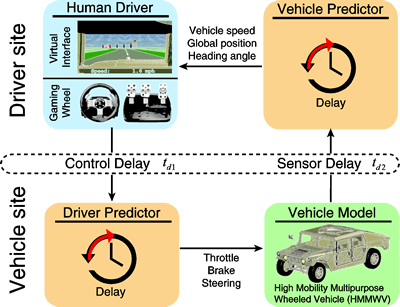Vehicle Controls & Behaviors
Annual PlanImproving Mobility through Latency Compensation in Teleoperated Ground Vehicles
Project Team
Government
Paramsothy Jayakumar, Mark Brudnak, U.S. Army GVSC
Faculty
Jeffrey Stein, University of Michigan
Industry
Mitchell Rohde, Steve M. Rohde, Quantum Signal LLC
Student
Yingshi Zheng, University of Michigan
Project Summary
Project completed 2017.

UGVs can be operated in different modes of operation ranging from teleoperated vehicles without any autonomy to vehicles with full autonomy. At the moment, all UGVs in the Army are teleoperated; therefore this proposal’s scope is teleoperated vehicles, as well. One important challenge with teleoperated vehicles is that the communication delays can negatively affect the vehicle mobility.
The overarching research objective of this project is to develop a control algorithm to compensate for the negative impact of communication latencies on mobility in teleoperated vehicles. The key feature that this control algorithm is desired to possess is to require minimal information about the system dynamics. The motivation for this requirement is to enable solution that is as platform independent as possible and can thus be readily applied to different types of vehicles with minimal tuning. As exemplified by the passivity based approach in the telerobotics literature, a platform-independent solution could have a large impact. The focus is on the communication control; methods that apply changes to the system such as adding autonomy is beyond the scope. Such methods could still work synergistically with the proposed method, however, we will not explore this synergy within the proposed effort.
This project aims to leverage driver models and vehicle models that are being developed and have been developed in related ARC project.
Publications:
- X. Ge, Y. Zheng, M. J. Brudnak, P. Jayakumar, J. L. Stein, and T. Ersal, “Performance Analysis of a Model-Free Predictor for Delay Compensation in Networked Systems”, IFAC Workshop on Time Delay Systems, Volume 48, Issue 12, 2015, Pages 434–439, Ann Arbor, MI, 2015. doi:10.1016/j.ifacol.2015.09.417
- X. Ge, M. J. Brudnak, P. Jayakumar, J. L. Stein, and T. Ersal, “A model-free predictor framework for tele-operated vehicles”, American Control Conference, Pages 4573 - 4578, Chicago, IL, 2015. doi:10.1109/ACC.2015.7172049
- Y. Zheng, M. J. Brudnak, P. Jayakumar, J. L. Stein, and T. Ersal, “An Experimental Evaluation of a Model-Free Predictor Framework in Teleoperated Vehicles,” IFAC Workshop on Time Delay Systems, Istanbul, Turkey, 2016.
- X. Ge, Y. Zheng, M. J. Brudnak, P. Jayakumar, J. L. Stein, and T. Ersal, “Analysis of a Model-Free Predictor for Delay Compensation in Networked Systems,” in Time-Delay Systems - Theory, Numerics, Applications and Experiments, vol. 7, Advances in Delays and Dynamics, T. Insperger, T. Ersal, and G. Orosz, Eds.: Springer, 2017.

